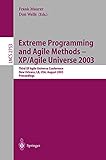Extreme Programming and Agile Methods - XP/Agile Universe 2003 [electronic resource] : Third XP Agile Universe Conference, New Orleans, LA, USA, August 10-13, 2003. Proceedings / edited by Frank Maurer, Don Wells.
Material type: TextSeries: Lecture Notes in Computer Science ; 2753Publisher: Berlin, Heidelberg : Springer Berlin Heidelberg, 2003Description: XII, 220 p. online resourceContent type: text Media type: computer Carrier type: online resourceISBN: 9783540451228Subject(s): Computer science | Software engineering | Logic design | Information Systems | Computer Science | Programming Techniques | Software Engineering | Programming Languages, Compilers, Interpreters | Logics and Meanings of Programs | Computers and Society | Management of Computing and Information SystemsAdditional physical formats: Printed edition:: No titleDDC classification: 005.11 LOC classification: QA76.6-76.66Online resources: Click here to access online
TextSeries: Lecture Notes in Computer Science ; 2753Publisher: Berlin, Heidelberg : Springer Berlin Heidelberg, 2003Description: XII, 220 p. online resourceContent type: text Media type: computer Carrier type: online resourceISBN: 9783540451228Subject(s): Computer science | Software engineering | Logic design | Information Systems | Computer Science | Programming Techniques | Software Engineering | Programming Languages, Compilers, Interpreters | Logics and Meanings of Programs | Computers and Society | Management of Computing and Information SystemsAdditional physical formats: Printed edition:: No titleDDC classification: 005.11 LOC classification: QA76.6-76.66Online resources: Click here to access online  E-BOOKS
E-BOOKS
| Current library | Home library | Call number | Materials specified | URL | Status | Date due | Barcode |
|---|---|---|---|---|---|---|---|
| IMSc Library | IMSc Library | Link to resource | Available | EBK5190 |
Becoming Agile -- Rebalancing Your Organization’s Agility and Discipline -- Extreme Programming: Growing a Team Horizontally -- Agile Planning with a Multi-customer, Multi-project, Multi-discipline Team -- A Tail of Two Projects: How ‘Agile’ Methods Succeeded After ‘Traditional’ Methods Had Failed in a Critical System-Development Project -- Agile Methods and Processes -- The Rules of the Game -- Achieving ISO 9001 Certification for an XP Company -- The Reflective Practitioner Perspective in eXtreme Programming -- Graph Theoretical Indicators and Refactoring -- Agile Testing -- The Test Automation Manifesto -- Test-Driven Database Development: A Practical Guide -- A Testing Checklist for Database Programs: Managing Risk in an Agile Environment -- JNI Testing -- Agile Regression Testing Using Record and Playback -- Make Haste, Not Waste: Automated System Testing -- Tool Support for Agile Teams -- Virtual Teaming: Experiments and Experiences with Distributed Pair Programming -- Issues in Scaling Agile Using an Architecture-Centric Approach: A Tool-Based Solution -- Developing a Tool Supporting XP Process -- Educator Symposiums -- XP Agile Universe Educators Symposium Overview -- Adapting XP to an Academic Environment by Phasing-In Practices -- Introducing Agile Methods in Learning Environments: Lessons Learned -- Pair Learning: With an Eye Toward Future Success -- Adaptations for Teaching Software Development with Extreme Programming: An Experience Report -- Workshops -- Workshops at XP/Agile Universe 2003 Introduction -- Workshop on Agile Development for Embedded Software Development -- Workshop on How to Maintain and Promote Healthy Agile Culture -- 2nd International Workshop on Empirical Evaluation of Agile Methods (“The Data Workshop”) -- Exploring Programmer Tests -- XPFest.
XPAgileUniverse2003isthethirdconferenceinaseriesrunninginNorthA- rica and attracting participants from all over the world who are interested in the research, development and application of agile software processes. Agile app- aches value people and interaction over processes and tools – moving software engineering from the process-oriented software development approaches of the 1990s towards people-oriented approaches that we are starting to see more and more in this decade. Agile approaches stress a holistic view of software deve- pers as being involved in analysis, design, implementation and testing activities, while more traditional, tayloristic approaches separate these tasks and assign them to di?erent “resources. ” Tayloristic approaches create knowledge-sharing problems as information gathered by one person needs to be handed over – usually in the form of documentation – to the next person in the chain. Agile approaches reduce the number of hand-o?s and, thus, decrease the amount of required documentation for knowledge sharing. While deemed a novelty only a few years ago, agile methods are now be- ming established in the software industry and are being applied in more and more application domains. While agile approaches move into the mainstream of software organizations, we are only now beginning to understand their bene?ts, areas of applicability, and also their dangers. This year’s conference will increase this understanding and provide a better base for industry practitioners as they assess the e?ectiveness of agile methods in their environment.


There are no comments on this title.